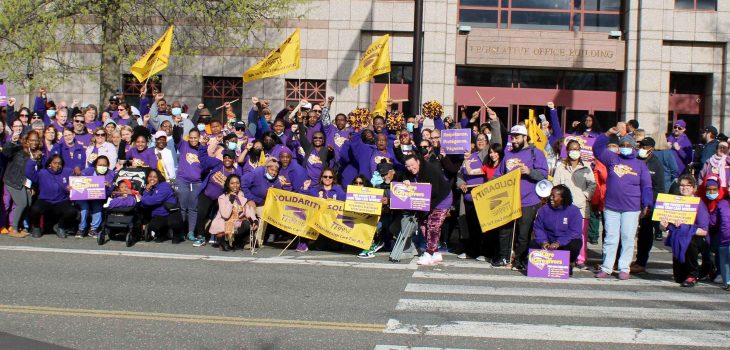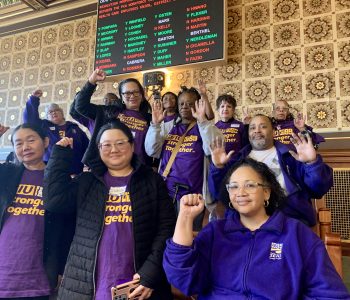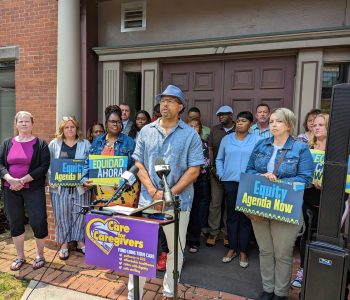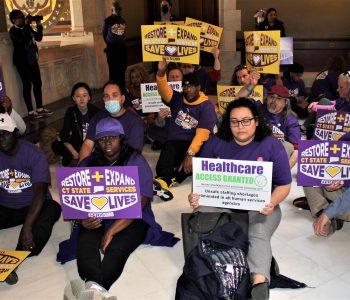 Featured Post
Featured Post
Long-term care workers rallied outside the Legislative Office Building in demand of a $25/hr minimum wage for group home, home care and nursing home workers, affordable health insurance, paid time off and pension funding.
This will require an additional $390 million in Medicaid funding for this budget to care for the elderly and individuals with disabilities in long-term settings and at home. (Federal funding covers 56% of Medicaid expenditures in Connecticut.)
As a majority women, Black, Latina, and white working-class labor sector, almost 2,000 long-term care staff in group homes will start taking strike votes across the state to achieve the economic justice that is long overdue.
“Tomorrow we will begin our strike voting. They must put more money for us in the budget so we can live. Tomorrow, at 10:00 am, we start our strike vote. We’re getting our union members fully activated with a strike vote so we can end poverty for all long-term care workers,” said Stephanie Deceus, Vice-President in charge of group homes at SEIU 1199 New England. “Today, we are giving you a little taste of what it means when we’re about to take a strike vote and shut it down!”
Union caregivers in group homes, nursing homes, and home care are the workforce that braved some of the deadliest and most mentally stressful workplace conditions at the peak of the COVID-19 pandemic.
“For long-term care workers, we are clear that we are 100% depend on state and federal tax dollars for the services that we provide. Be it group home care, nursing home care, or home care, none of those things are possible if the state fails to put that funding in the state budget,” said Rob Baril, union president. “All we are asking for is a minimum living wage of $25 an hour for long-term care workers, with affordable health care, paid time off and a pension. Ending poverty costs money.”
Baril explained that there is plenty of public funding available to lift long-term caregivers out of poverty, while also funding state colleges paraprofessionals and other state services that provide equity and economic justice across the state.
“The state has enough money to solve the long-term care problem. It’s a problem created by a lack of investment in the workers who give direct care to the elderly and individuals with disability. These workers are mostly women, people of color, and white working-class caregivers at group homes and nursing homes, or providing home care assistance,” said Sen. Saud Anwar, Senator Saud Anwar (East Hartford, Ellington, East Windsor, South Windsor) at the rally. “They serve Medicaid recipients, with 56% of the funding provided by our federal government. We know we can’t make everybody happy with this budget. But we can fight for equity and justice. Let’s work together to end the cycle of poverty for long-term care workers.”
“We’re calling on legislative leadership and the governor to do the right thing and put forward the funding to make sure no caregiver lives in poverty,” said Rose Folsom, a personal care attendant providing care in people’s homes. “I’m 55 years old. I’ve cared for others who can’t live independently for nearly two decades. And yet I have almost nothing to show for it: no paid time off yet, no savings for retirement, no health insurance of my own. We’re simply asking for the same rights and freedoms that all people deserve: the ability to contribute to a greater good and be able to pay our bills.”
SEIU District 1199NE, the New England Health Care Employees Union, represents over 25,000 caregivers in Connecticut and some 4,000 in Rhode Island. Historically known as “1199” going back to the Civil Rights Movement, we are a bold, democratic Union with a long activist tradition fighting for racial and economic justice to improve the lives of Black, Latina, Native American, AAPI, and white working-class communities.
Media Contact: Communications Department, comms@seiu1199ne.org, 860-251-6015









